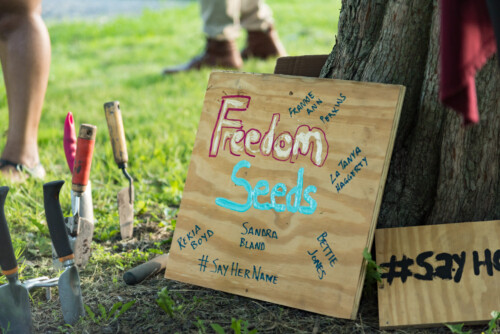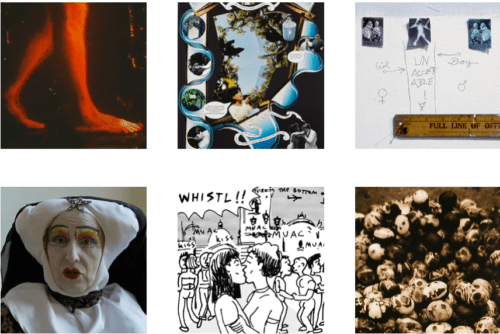The South as a Testing Ground: The Usage of LGBTQ Communities by the Right Wing
In order to understand what this work means, we must understand not only who our communities are and what they need, but also the role that we have been cast in a right-wing agenda. The right works as a cover for the interests of global capitalism, and they are in an extremely effective stage of their history right now. The right, especially the theocratic right, has been extremely successful in organizing the South to vote along a conservative “family values” agenda and in taking over public institutions from school boards to legislatures. To build their voting base, they have created a beast with several arms, including opposition to: women’s equality; homosexuality; gay rights; sex education; family structures that don’t reflect marriage between a man and woman and children with official legitimacy; and ultimately, underlying everything, all the gains of the civil rights movement. Every strategy of the right in the South builds on resentment of the civil rights movement, and even when homophobia appears to be the focus, racial discrimination is always a goal. The right drives toward an authoritarianism that is deeply patriarchal and fundamentalist. In particular, the right has used homosexuality as a wedge issue to mobilize voters; raise millions of dollars; and paint LGBTQ people as sick, sinful, and antifamily sexual perverts. The strategy has been to separate LGBTQ people from their communities, from their families, and in particular, from all children. It has been a classic effort to dehumanize and destroy us. It is no surprise that the right would use the South as its first terrain for these strategies. The stereotypes of the South are primarily of conservative, religious, and poor white people in rural communities. This is only a partial truth. The South is growing into a region with one of the highest concentrations of African Americans and Latinos in the United States, huge communities of poor and working-class people, and the largest U.S. rural population. To ignore the South is to ignore these communities and their needs. The right has been successful in convincing progressive communities in the United States to abandon the South. This needs to change if we want to unlock the keys of the right’s core strategies.
Bold Action in the Name of Queer Liberation
As people in the South, we know that we hold only part of the puzzle when it comes to a strategy that can move us toward the next level in our work for global queer liberation. Through dialogue and commitment to a common cause, we can find ways forward, together with many of you who are reading this. We offer this evolving list as a set of places to start (or continue) key conversations about next steps in our collective queer agenda:
- Given our losses at the polls with even the most watered-down versions of questions that matter to us (for example, marriage ballots, etc.), we must unleash our creativity around a wider range of strategies that could bring out our messages, communities, and work on a greater scale.
- Recognize the importance of combining conversations and writing on LGBTQ intersectionality with symbolic media action, direct action, base building, and amplification of intersectionality through grassroots organizing. When this synergistic work is happening, we must document, amplify, and replicate it well.
- Build our capacity for resiliency and problem solving until it is as strong as our capacity to be critical. Twenty years of bringing righteous critique to a mainstream LGBT agenda has left us weak in the areas of transforming beyond conflict and toward united action. When a leader makes a mistake, we often eat that person alive. This has to stop if we are to make bold steps toward queer liberation.
- Try out new ideas and move faster on opportunities. Given that there is so much we can work on as queer liberationists, we can easily get stuck in the stage of considering our choices for strategies and tactics. We need to take responsibility for—and transform—our tendency in the “queer left” to get so caught up in the process that we do not lead work that can affect hundreds of thousands (in some way, space, or form) rather than groups of 20 or fewer at a time. There is no perfect choice when our people are suffering this much. Our pride and perfectionism must come second to our need to try new strategies and make mistakes in order to win concrete gains and learn lessons.
- Strengthen our ability to get across messages to one other and to themedia in an intersectional and accessible way. There is so much public conversation about LGBTQ people, but too little amplification of our own voices about our own lives. Those who do speak for us are usually bringing a mainstream agenda.
- Build real relationships and trust with new coalitions and alliances that may seem to be unlikely partners, particularly those that represent large bases of marginalized communities. As we work on fronts of struggle that unite us with broad groups of marginalized people, we must take risks together. Of course, risks in movement building look vastly different for people based on their individual privileges and power. At the same time, our people (in the South and elsewhere) are constantly showing that they are ready to take risks, and those of us who are strategists need to be dreaming up plans worthy of their courage.
- Recognize that for many queer liberationists this is political and spiritual work. In SONG’s campaign in North Carolina, 35 percent of our 16,000 signed-up volunteers were people of faith. We must transform our organizations to meet the needs of our bases—and name this work for all it is and all it means to people, while still holding firm to our politics and our fight against religious supremacy and fundamentalism.
- Organize in line with visions worthy of our history, our legacy, and our people. We have to be able to draw a direct line from our current strategies to our long-term liberation dreams—no matter how long that line is in terms of time, or how beset the landscape is by massive challenges. Wins must be defined within that long-term vision, with an eye for concrete needs of our people now.
- Be good to one another by supporting, challenging, and transforming our own leadership. We must constantly ask one another and ourselves if we are willing to be transformed in the service of this work. If we are still in this work, someone has been patient with our leadership, and in turn, we are called upon to be patient with other leaders.
In Conclusion
Because our survival depends on the process toward queer liberation, this agenda (crafted by thousands) will go forward whether large national organizations adopt it or not. However, we call on them to do so. We call on mainstream national organizations to use their resources to respectfully listen to, support, convene, and strategize and network with grassroots groups on the front lines. We move forward in this work with the support of many long-term relationships, particularly the support of the groups in the ROOTS coalition, Astraea Lesbian Foundation for Justice, Project South, the Georgia Latino Alliance for Human Rights (GLAHR), the National Day Laborers Organizing Network (NDLON), and many others. Our work is made possible because of this larger legacy and fabric of work. We hope that some part of the work we have done here is helpful to you. For more information visit SONG’s website.



